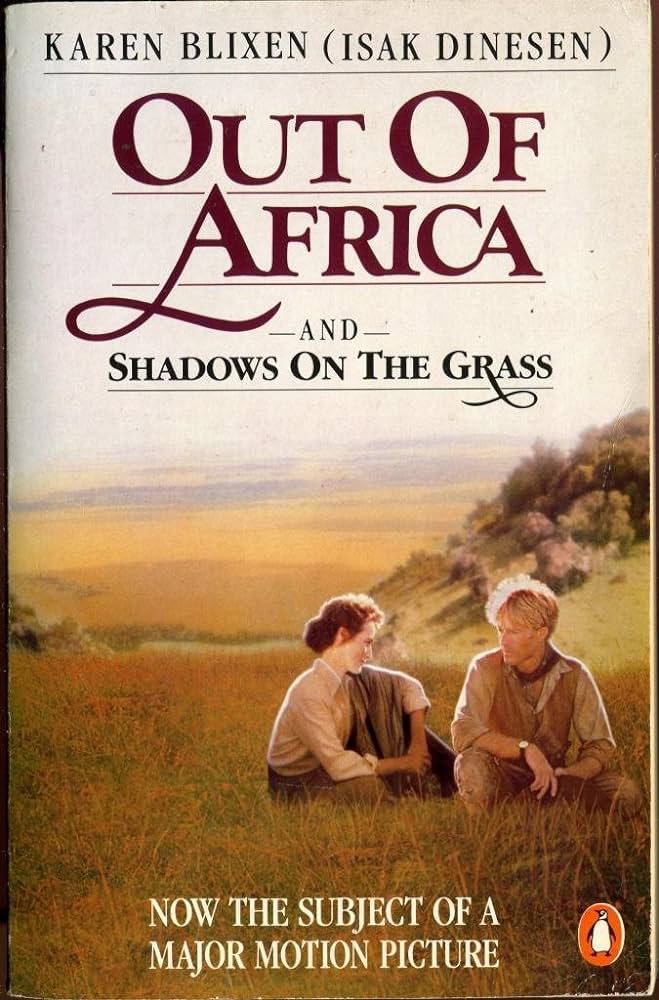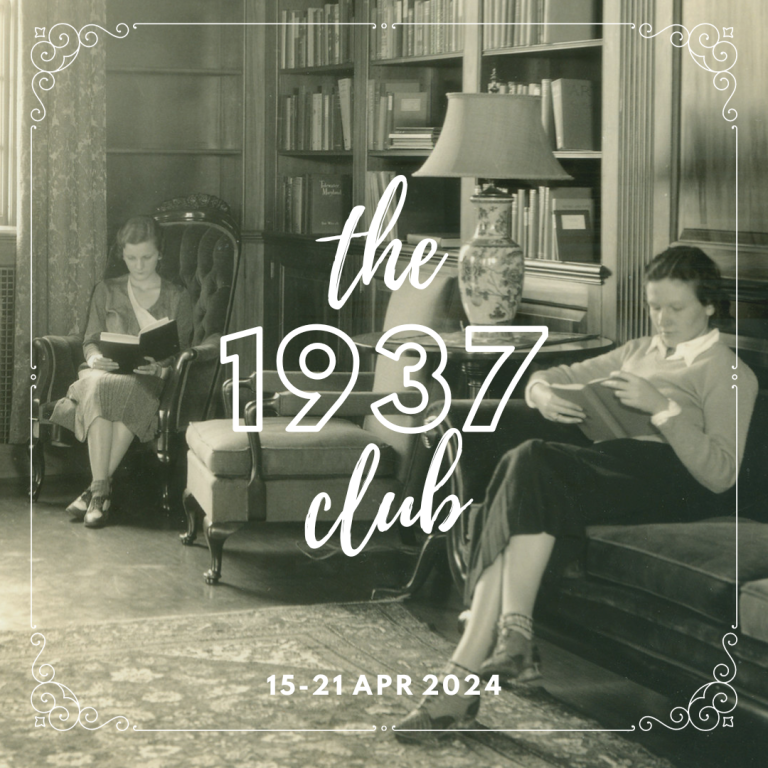Twice a year, Simon at Stuck in a Book and Karen at Kaggsy’s Bookish Ramblings host an interesting reading event, the year club. We read books published in that year indicated by the number and write our reviews. This time, from April 15-21, we are doing the year 1937.
Many fine titles were published in 1937, but for me, it’s an easy choice: Out of Africa, the memoir of Danish author and baroness Karen Blixen (1985-1962). Interesting to note that she had several pen names. In the English speaking countries, she was Isak Dinesen.
Ever since watching the 1985 movie Out of Africa, I’ve always wanted to read the source material, Blixen’s autobiography about her seventeen years (1914-1931) living in Kenya operating a coffee farm. In a way, I want to cast aside the image from the movie, however romantic, of Meryl Streep and Robert Redford sitting in green pastures picnicking, with Mozart’s Clarinet Concerto coming out from a gramophone, the music sweeping serenely across the pristine African landscape.
Blixen’s life in Kenya was no small venture: a pioneer woman operating a coffee farm situated in the six thousand acres of her land at the foothills of the Ngong Mountains. She rode horses, went on safaris, shot lions to defend her oxen, herself and others. When in the capital, Nairobi, she was a business woman; when on her farm, she was doctor to those lined up to see her with their sickness and ailments. She sent those that she couldn’t handle to the hospital and visited them, seeing to their recovery.
Blixen’s chronicles of her life in Africa intertwine objective observations and intimate thoughts. When describing the different ethnic groups in the land, the Natives Kikuyu, or her neighbours the Masai, or the immigrants the Somali… her writing is like an astute anthropologist, always with admiration. When referring to the Somali women, she writes:
There was no ignorance in their innocence. They had all assisted at childbirths and death-beds… Sometimes to entertain me, they would relate fairy tales in the style of the Arabian Nights, mostly in the comical genre, which treated love with much frankness. It was a trait common to all these tales that the heroine, chaste or not, would get the better of the male characters and come out of the tale triumphant… I felt the presence of a great ideal… the idea of a Millennium when women were to reign supreme in the world. (131)
Considering the above was noted earlier than 1931 (the year she left) in Africa, was Blixen a visionary ahead of her times, or… was it the Somali women?
When describing those close to her, like her invaluable assistant Farah, she presents a character study with free flowing, deep feelings of love and respect. In the essay collection at the back of this book, Shadow on the Grass, she has a whole chapter on Farah, of whom she describes a special relationship of Unity, that of Master and Servant, in no subordinate sense but an indispensable bond of loyalty and mutual respect. Blixen gives a few examples of such Unity, like Don Quixote and Sancho Panza. For contemporary readers like us, maybe the Downton relationship between Robert Crawley and John Bates would be a more visible example.
[Spoiler Warning here] Unlike the movie, Blixen mentions her friend Denys Finch-Hatton (Robert Redford in the movie) only sporadically in the first half of the book. Towards the end she devotes a few chapters on him upon his tragic plane crash. The two chapter titles are indicative of his character: ‘The Noble Pioneer’ and ‘Wings.’ Denys had almost become a Native himself, knowing the people of the land thoroughly, having had spent decades there, his love for them is reciprocal. His bi-plane is an apt metaphor for his courage and unbound spirit of exploration. His gramophone is an object of desire as the music it plays is a shared joy between him and Blixen, as well as a novel attraction mesmerizing all those on the farm. Of Denys, Blixen writes:
What they really remembered in him was his absolute lack of self-consciousness, or self-interest, and unconditional truthfulness which outside of him I had only met in idiots. (247)
Kudos to film director Sydney Pollack, the movie shows what’s unsaid between the lines. Blixen had deep feelings for Denys, but from the text, she’s restrained and devoid of sentimentality. That’s what makes the final chapters so poignant. Unlike the movie, there’s no romance depicted, just friendship and mutual admiration. There are letters and other writings of Blixen’s which I’m sure the filmmakers had researched on, and thus the more intimate dramatization of them as lovers in the movie. Furthermore, the aerial shots of Deny’s bi-plane over the African landscape, hills and valleys, plains and waters, spurring flocks of shore birds to soar to the sky, our reading imagination visualized; John Barry’s heart-stirring, expansive score complements the mesmerizing cinematography. And yet, I’ve fully enjoyed Blixen’s writing as well, intimate and poignant.
The farm eventually failed financially and Blixen had to move back to Denmark. Selling it out and bidding farewell is like leaving her soul there. She describes her last safari at dusk:
The plains with the thorn-trees on them were already quite dark, but the air was filled with clarity – and over our heads, to the west, a single star which was to grow big and radiant in the course of the night was now just visible, like a silver point in the sky of citrine topaz. The air was cold to the lungs, the long grass dripping wet, and the herbs on it gave out their spiced astringent scent. In a little while on all sides the cicadas would begin to sing. The grass was me, and the air, the distant invisible mountains were me, the tired oxen were me. I breathed with the slight night-wind in the thorn-trees. (191)
This is one of those books that will linger in my heart long after I finish and to which I know I will return.
***
Related Post on Ripple Effects:
‘Flappers and Philosophers’ by F. Scott Fitzgerald: My entry into the 1920 Club


Brilliant review – thank you. This is one of those books I’ve always intended to read but never got to!
LikeLiked by 1 person
Thanks for hosting, Karen!
LikeLiked by 1 person
A book I have intended to read too, but haven’t. Good on you for drawing some comparisons with the film too.
LikeLike
Hope you’ll have the chance to read it some day. It’s a pleasant surprise to me.
LikeLiked by 1 person
I LOVE the film Out of Africa. I have seen it more times than I can count, so moved by Meryl Steep and Robert Redford’s parts. They seem to epitomize the tragic part of love stories which so often calls my name. I have not yet read the book, but I plan too, someday.
Thanks so much for being a faithful, and dear friend, all these years.
LikeLiked by 1 person
And John Barry’s music is heart-stirring, just like his compositions in Dances with Wolves and Somewhere In Time.
Left a comment on your brand new blog. All the best to you for your next chapter in blogging over at Blogspot! I look forward to more reading together in the days ahead! 😉
LikeLike
East Africa isn’t West Africa, and yet the experience of leaving Africa seems to have affected both Blixen and I in some similar ways. I actually left twice, since the pull back to Liberia was so strong after the first departure I ended up going back. When people asked why in the world I’d go back to such a place, I’d just say, “I’m homesick.”
I remember a conversation I had with a fellow on the flight back to the U.S. after that second visit. He said, “No one likes Africa. You either love it or hate it, and if you love it, even if you leave, Africa never will leave you.”
LikeLike
Linda this is a must read for you then. Actually I was thinking about you when I read this book. I’m sure you’d find it even more interesting and might evoke some hidden memories as well. You’d love her writing too, no flowery descriptions but matter of fact recording of people as scenes.
LikeLiked by 1 person
I remember being mesmerized by the film and all those gorgeous scenes. I read the book ages and ages ago. I wonder how it holds up in terms the colonialism which is why Blixen was able to own a farm there to begin with?
LikeLike
Thanks Stefanie for pointing out the elephant in the room. Yes, I tried to avoid discussing colonialism, because the main, lingering thought that followed me while reading the book was ‘humanity.’ Surely Blixen enjoyed the privilege of being a white woman in British East Africa, her accounts of her life there and her relationships with the various groups of people there were marked by mutual respect and I can even use the word, love, for the people, the land, and nature there. So, to be ‘faithful’ to the spirit of Blixen’s writing, I avoid the political aspect. Come to think of it, during the 1930’s, many parts of the world were under colonial rule, but human stories and relationships did exist and countless stories can still and ought to be told. But, yes, thanks for bringing the political issue out.
LikeLike
I read this book years, decades ago — after I saw the movie, which is one I love. (It never seems to show up on streaming, but then I don’t have Amazon.) I loved your thoughtful observations — for me it has been a long time.
LikeLike